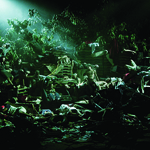|
|
 |
Dusted Reviews
Artist: Black to Comm Album: Earth Label: De Stijl Review date: Jan. 7, 2013 |

|
|
|
 |
Under the name Black to Comm, Hamburg resident Marc Richter has shown a predilection for collage aesthetics, similar to many artists he’s featured on his Dekorder label. On his new record Earth, originally a soundtrack to a silent film by Ho Tzu Nyen, he’s still keen on leaving the specifics of sound source vague by freely mixing samples, electronic processing, and instruments played live, yet all the while he’s pushing at compositional boundaries he’s kept in place on past releases. Richter has filled prior albums, like 2009’s Alphabet 1968, with gaseous swirls, decaying carnival waltzes, field recordings drowned in bass, and countless other concrète hallmarks, each as its own miniature portrait, which has marked him as a gifted yet scattershot practitioner. On Earth, he sounds settled, and maybe all it took was a vocalist.
The man whose warbling voice cascades throughout Earth is David Aird, who records with British hauntology bastions Mordant Music under the name Vindicatrix. His deep register immediately recalls the operatic inclinations of Scott Walker, and Richter, consciously or not, ensures the resemblances don’t stop there. The five tracks here - made by splicing sound pulled from harmonium, singing saw, acoustic guitar alternating between tender plucks and dissonant strums, looping shellac, and much more - have been carefully constructed into off-kilter chamber pieces much like late-period Walker that let the album rise and fall in a theatrical five song structure.
Unlike Walker, who has used his discordant compositions largely as foils for dramatizing the lyrical content, Richter’s use of Aird lessens the importance of most words. Richter sets him adrift among the other interlinked sounds, even as his baritone presence lingers above the rest by force, whether moaning wordlessly or mumbling unintelligibly. Eventually, understandable fragments will stick out, some repeated throughout the album in expressionist bursts: words like "tropical", "awake", "anti-gravity, anti-sexuality", and numerous phrases that tend to mark bodily experiences of sumptuousness, rising action, and decay. The tactile words find greater embodiment in the tightly arranged shorter works "Water" and "Thrones", where the choral processing of Aird’s wails preside over discreet ballad forms Richter has scored for acoustic guitar and reverb-heavy piano, respectively. Elsewhere, the walls of sound try to swallow Aird, but here he has space to aggressively etch into the tracks, painting still scenes of mourning that echo the Géricault-derived album cover (which comes straight from a clip in the film) or longing in a Mark Hollis song.
The vaporous "Mirror" closes the record on what sounds like a swift exit. With a slow drum machine and two stately chords anchoring everything else, it’s the least "broken", most straightforwardly melodic piece on Earth, and its simplicity in that regard could be construed as a retreat, bringing Richter back to the instrumental sketches of past work. It breathes much easier than anything else on Earth, initially sounding out of place, and yet its lack of progression also makes it the hardest track to treat as a standalone cut. As such, the album ends on a deceptively uncomfortable note, which is saying something given the hoops Richter has pulled the listener through during the preceding half-hour. Without leaving any clear indications of Richter’s next steps, it stamps a seal on what has been the most singular and emotionally consuming release from Black to Comm so far.
By Jonathan Woollen
|







